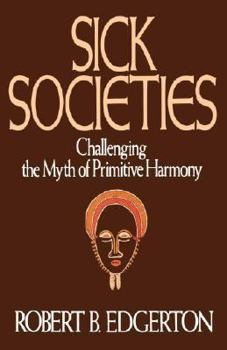Sick Societies
Author and scholar Robert Edgerton challenges the notion that primitive societies were happy and healthy before they were corrupted and oppressed by colonialism. He surveys a range of ethnographic writings, and shows that many of these so-called innocent societies were cruel, confused, and misled.
Format:Hardcover
Language:English
ISBN:0029089255
ISBN13:9780029089255
Release Date:November 1992
Publisher:Free Press
Length:288 Pages
Weight:1.25 lbs.
Dimensions:0.8" x 6.5" x 9.5"
Customer Reviews
5 ratings
One of my favorite books
Published by Thriftbooks.com User , 20 years ago
I first read this book while sitting in a library at Eastern Montana College in 1993. I could not put it down. A few years later I checked it out from a library on the east coast and read it again. Same story. Then this past year I once again checked it out from a library in Las Vegas and read it from cover to cover for the third time. Highly releveant to a lot of socal and historical discussions. Well written. The author is to be commended for a fascinating book.
Anthropology Redeemed
Published by Thriftbooks.com User , 20 years ago
Anthropologists don't get any academic accolades for identifying a behavior or custom as maladaptive; Rather they feel compelled to demonstrate they have shed their own ethnocentrism by going through empirical and interpretive contortions to define virtually all primitive conduct, regardless of how perverse it is, as adaptive. UCLA Professor of Anthropology and Psychology, Robert Edgerton understands this, and courageously takes his colleagues to task in an erudite, readable and gracious manner. The anthropologically inclined will find his global survey of primitive cultures fascinating. Those not so inclined may find the repetition of the theme somewhat morbid. Nevertheless, Edgerton's case would be less compelling without the multitude of ethnographic evidence he presents. Although the author doesn't say so, moral relativism leads to cultural relativism, which leads to a bogus multiculturalism, which, in turn, results in a slandering and denigration of Western civilization. Anything that breaks this chain is a much needed contribution, and Edgerton does a masterful job of demolishing the link of cultural relativism. The discipline of Anthropology is much in his debt.
The Fall of Cultural Relativism
Published by Thriftbooks.com User , 23 years ago
This is unquestionably one of the most important works in anthropological theory in the last half of the 20th century. Edgerton's Sick Societies forces us to question the basic assumptions of cultural relativism that have dominated anthropological thinking for most of the 20th century. The Star Trek prime directive not to interfere in the cultural evolution of a society, and the anthropological assumption that societies can only be judged by their emic criteria (from which the Star Trek prime directive was based) is demonstrated to have no relevance or validity. What I particularly like about this book, outside of its enormous intelligence, is the way that it demolishes the rationale of postmodernism while laying a strong foundation for a viable applied anthropology. A masterpiece!
Sorry Things Go Wrong All Over
Published by Thriftbooks.com User , 23 years ago
Robert Edgerton had obviously been keeping notes for decades on something that was bugging him about the state of academic anthropology. Namely, he was annoyed by the idea that some societies are primitive and idyllic, and that technologically advanced societies are the bad guys of the planet. Certainly, Edgerton admits that modern societies have problems. The only thing that allows us to think that things used to be better than they are now is wishful thinking coupled with ignorance. If we were not ignorant we would know that life was cruel, socially, physically, and economically - of which he gives dramatic demonstration. If we were not ignorant we would know that the position of women and children was abysmal, say what New Agers will. The only thing bad about Sick Societies is that it pulls the wool from our eyes. For me, I realized that things are getting better, not ever-decaying as one would gather by way of the Noble Savage Myth. "Things used to be so great and now look," the Noble Savage Myth states. There was never a golden age. We are drawing ever closer to it, by the measures laid out by Edgerton. This positive take is purely incidental to reading the book, but the conclusion is inescapable.For anyone who wishes to seriously engage the discipline of anthropology this book is a must.
One of the most intelectualy stimulating reads.
Published by Thriftbooks.com User , 28 years ago
Every now and then I venture outside my chosen field (systems engineering) and hike into the forest of "New Possibilities" by going into a section of the book store I wouldn't usually go into. While "Sick Societies" was not my first introduction to anthropology, it was my most exciting by far. Although Mr. Edgerton is overly defensive of his stance, he has excelent arguments for abolishing the "total non-interference" policy adopted by modern anthropoligists. I liturally (pun) could not put this book down. I read half of it while at the store, the other half that evening. The plethora of example studies will floor the reader and at times completely shock. It's great to know we are still an exciting species.





